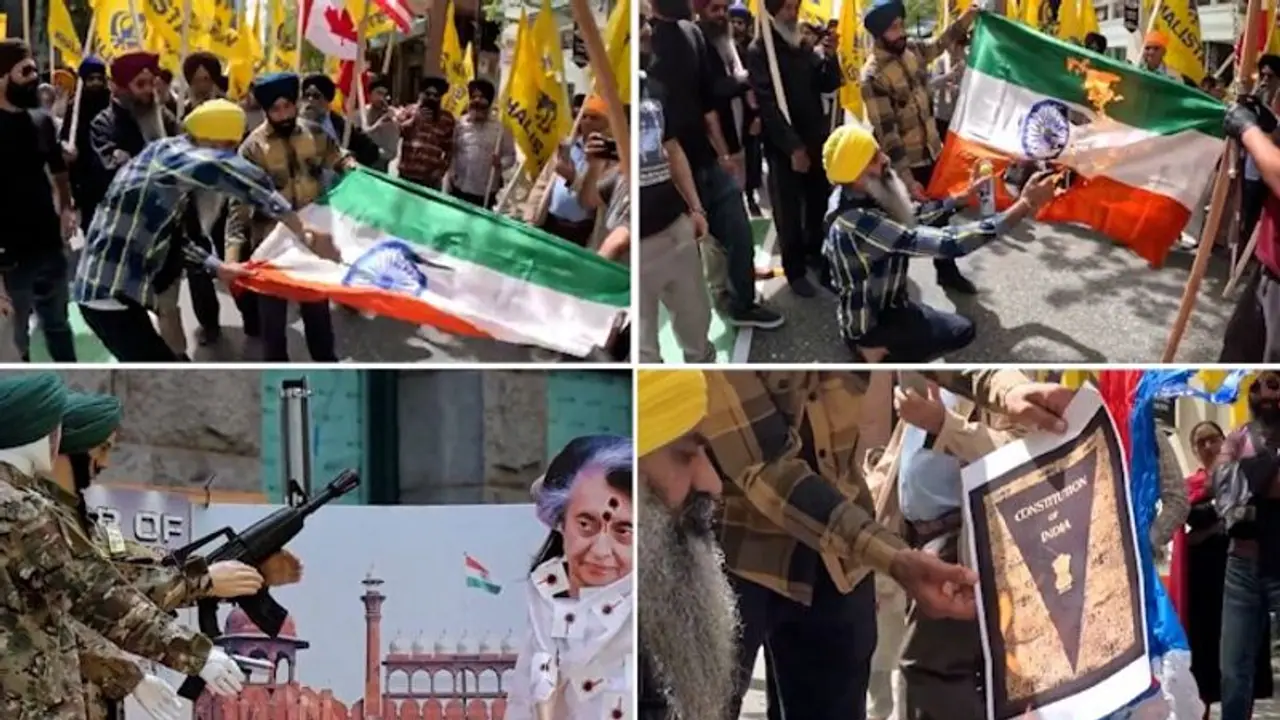In Canada, outside the Indian consulate in Vancouver, Khalistani separatists brazenly glorified the assassination of former Prime Minister Indira Gandhi.
As June 6 marked the anniversary of Operation Blue Star, a somber occasion for many in India, recent events have reignited concerns over the resurgence of Khalistani extremism, both at home and abroad. Pro-Khalistani sentiments have once again taken center stage, with disturbing displays of glorification of violence and terrorism against the backdrop of historical grievances.

In Canada, outside the Indian consulate in Vancouver, Khalistani separatists brazenly glorified the assassination of former Prime Minister Indira Gandhi. Shockingly, posters depicting Gandhi riddled with bullets and honouring her assassins, Beant Singh and Satwant Singh, were prominently displayed. The despicable act not only celebrates a tragic loss of life but also underscores the depth of extremism still prevalent within certain segments of the diaspora community.
Equally alarming were videos showing Indian and Russian flags being burned alongside the grotesque tableau and the Indian Constitution, indicating a blatant disregard for diplomatic norms and a provocative stance against established authorities. The complicity or indifference of Canadian Prime Minister Justin Trudeau in allowing such hateful displays to take place on Canadian soil has drawn sharp criticism, raising questions about his government's commitment to combatting terrorism and hate speech.
Meanwhile, similar incidents unfolded in India on Thursday, particularly at the revered Golden Temple in Amritsar, where pro-Khalistani slogans were raised on the solemn occasion. The sight of posters venerating the slain separatist leader, Jarnail Singh Bhindranwale, and the presence of prominent figures like Shiromani Akali Dal (Amritsar) chief Simranjit Singh Mann among the protesters, served as a stark reminder of the ongoing ideological divide within the Sikh community.
In response to these provocative acts, security measures around the Golden Temple were intensified, with authorities on high alert to prevent any potential escalation of tensions. Senior Superintendent of Police SS Randhawa Singh reiterated the commitment to maintaining peace and order, emphasizing the need for vigilance in the face of external provocations.
In Canada, there have been instances of controversial displays in the past. For instance, during a 5-km Sikh march in Brampton on June 4, 2023, a tableau depicting the assassination of Indira Gandhi by her Sikh bodyguards was featured. This tableau, part of the annual Sikh Martyrdom Parade, included Khalistani flags and posters with slogans such as “Revenge for the attack on Shri Darbar Sahib” and “Never Forget 1984. Sikh Genocide.”
Similarly, in November 2023, Canadian singer and rapper Shubhneet Singh (known as Shubh) faced controversy during a concert in London. A video shared by a pro-Khalistani source showed him wearing a hoodie featuring an illustration of Punjab and a caricature related to the assassination of Indira Gandhi, seemingly endorsing her assassins, Satwant and Beant Singh.
Similarly, last year, on May 28, reports stated that pro-Khalistan posters featuring Khalistani extremist Jarnail Bhindranwale were found outside the Golden Temple in Amritsar. This occurred ahead of the 39th anniversary of Operation Blue Star. One of the posters outside the Golden Temple bore the message, “Tributes to the martyrs of Sri Darbar Sahib of June 1984.” Operation Blue Star was conducted by the Indian Army, as ordered by Prime Minister Indira Gandhi, to root out militants from the Golden Temple.
Jarnail Singh Bhindranwale, the leader of the radical Sikh outfit Damdami Taksal, and his armed followers were killed during Operation Blue Star. The operation, launched on June 6, 1984, faced significant criticism. Months later, on October 31, 1984, Gandhi was assassinated by her Sikh bodyguards.
Jarnail Singh Bhindranwale, leader of the radical Sikh organization Damdami Taksal, and his armed followers were killed during Operation Blue Star. This military operation, initiated on June 6, 1984, was carried out by the Indian Army under the directive of Prime Minister Indira Gandhi, aimed at eliminating militants from the Golden Temple.
Following Operation Blue Star, which received significant criticism, Gandhi was assassinated by her Sikh bodyguards on October 31, 1984.
In the recent Lok Sabha elections, Sarabjeet Singh Khalsa, the son of Beant Singh (one of Indira Gandhi’s assassins), secured victory in the Faridkot constituency. Khalsa emerged triumphant with a margin of 70,053 votes over Aam Aadmi Party leader Karamjit Singh Anmol.
Previously, Lieutenant General (Retired) Kuldeep Singh Brar, who led the 1984 Operation Blue Star aimed at removing extremists from the Golden Temple, commented that the late Prime Minister Indira Gandhi had permitted militant leader Jarnail Singh Bhindranwale to evolve into a "Frankenstein monster" before opting to "eliminate him" when his influence became too substantial.
In an interview with ANI, the retired 1971 war veteran said, “No one wants an operation, but what do you do? Indira Gandhi allowed him to become “Frankenstein”. You could see every year what was happening. But when he reached the pinnacle, now finish him off, now destroy him. It’s too late.”
He further claimed that the political leadership of the time had permitted the Bhindranwale cult to thrive, driven by internal political dynamics between the Akali and Congress parties. “They had their own little problem support between Akali and Congress. They allowed this cult of Bhindranwale to continue,” the retired army officer stated.
